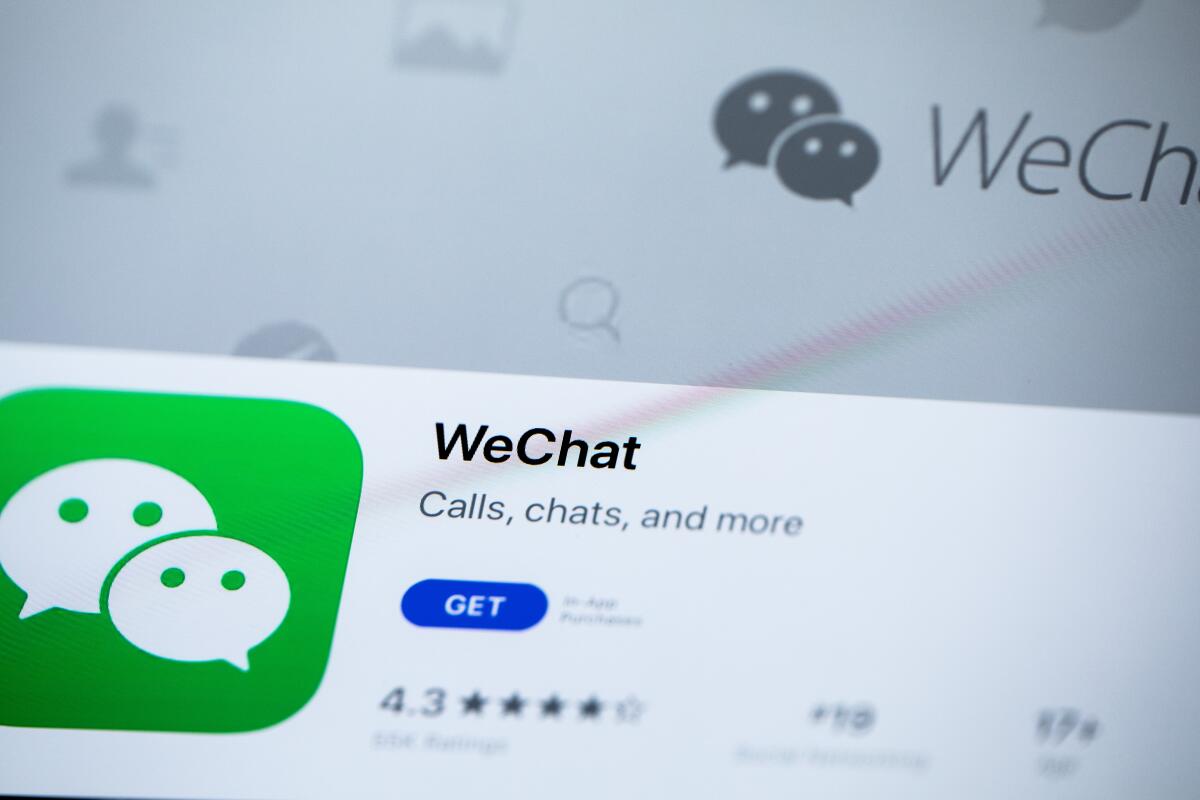Trump officials say WeChat ban won’t keep Apple out of China

- Share via
The Trump administration is privately seeking to reassure U.S. companies including Apple Inc. that they can still do business with the WeChat messaging app in China, according to several people familiar with the matter, two weeks after President Trump ordered a U.S. ban on the Chinese-owned service.
In recent days, senior administration officials have been reaching out to some companies, realizing that the impact of an all-out ban on the popular app, owned by China’s Tencent Holdings Ltd., could be devastating for U.S. technology, retail, gaming, telecommunications and other industries, people familiar with the discussions said.
Apple is one of the companies that could stand to lose the most from the WeChat ban because China represents a fifth of its sales. Apple also relies on China for a large chunk of its manufacturing, which could be affected if the Chinese government decided to retaliate.
Representatives for Apple, Treasury and the White House declined to comment. A spokesperson for Tencent, which is one of China’s biggest companies, didn’t respond to requests for comment.
The administration is still working through the technical implications of how to enforce a partial ban on the app, and a key question is whether the White House would allow Apple and Alphabet Inc.’s Google to offer the app in their global app stores outside the U.S., and if so, where, according to the people, who spoke on condition of anonymity.
Senior administration officials are deliberating over the scope of the ban ordered by Trump, one of the people said, and the president could ultimately overrule anything they decide.
The administration cited the national security risk of leaving Americans’ personal data exposed to China in announcing the ban earlier this month.
The officials expect that WeChat won’t completely vanish in the U.S., but their aim is to prohibit any downloads or updates of the app in the country, according to three of the people.
For swaths of the U.S. with concentrated Chinese populations, WeChat is a way of life. President Trump’s executive order banning the app could upend that.
For example, travelers coming into the U.S. who have WeChat on their phones likely will be able to use the app, but they won’t be able to update it. That means that the WeChat version of a non-U.S. resident staying in the country for a longer period would probably become obsolete over time, the people said.
Trump is escalating his fight with Beijing three months before the November presidential elections and has blamed China for the COVID-19 pandemic.
In addition to Trump’s ban on WeChat and a related order barring business with the popular Chinese-owned TikTok video app, the administration has made other moves to pressure Beijing. Those include sanctions on the top official in Hong Kong and recommendations that American stock exchanges set new rules that could trigger the delisting of Chinese companies.
A partial WeChat ban could mean that companies like Apple could offer it in their China app stores and businesses like Starbucks Corp. could continue to sell coffee or accept payment via the app in China. The intention is to prohibit any downloads or updates of the WeChat app from U.S. app stores, two of the people said.
High-level administration officials, including Treasury Secretary Steven T. Mnuchin, economic advisor Larry Kudlow, White House counsel Pat Cipollone and Deputy National Security Advisor Matt Pottinger met Tuesday to discuss the WeChat ban, said two people familiar with the matter.
The discussions follow Trump’s Aug. 6 executive order prohibiting U.S. residents and companies from doing business with WeChat starting in mid-September, which set off alarm bells across U.S. companies with operations in China. WeChat is an indispensable part of doing business in the country and selling products to consumers there, who use the app for everything from buying coffee to airline tickets.
In recent weeks, U.S. companies and their lobbyists went into overdrive, asking staffers in the White House and the Commerce Department about the logistics and intention of the WeChat executive order, according to people familiar with the matter.
“We are talking to everyone who will listen to us,” said Craig Allen, president of the US-China Business Council, which represents companies including Walmart and General Motors Co. “WeChat is a little like electricity. You use it everywhere” in China, Allen said.
He didn’t confirm conversations with the administration but said his group has been trying to illustrate the “downsides to an expansive interpretation of the order.”
Among the questions that have been raised include whether the order would ban American companies that have a presence in China or Chinese subsidiaries of those companies from accepting payment for their products through WeChat, the people said. The lobbyists also wanted a better definition of what the administration would consider a “transaction” under the order, the people said.
Representatives from the National Retail Federation and the Retail Industry Leaders Assn., which represents companies such as Best Buy Co., Target Corp. and Lowe’s Cos., are among the lobbyists who have raised questions, the people said.
WeChat is the world’s most popular messaging app, with more than a billion users. Banning the app, even just in the U.S., could shut down personal communications between America and China. It would also disrupt operations of international companies that rely on the app for cross-border business.
“If the business community can’t use WeChat in China, from advertising to processing payments, it’s a shortcut to decoupling the two economies,” said Samm Sacks, a fellow at the New America think tank in Washington. Sacks said shutting down the ability to use WeChat in the U.S. will push Americans working with Chinese colleagues and businesses to mimic the elaborate workarounds that Chinese use to reach the outside internet. “It creates the American version of the Great Firewall.”
Shares of Tencent plunged as much as 10% after Trump’s Aug. 6 executive order, erasing nearly $35 billion in market value as investors worried that the tech conglomerate’s gaming operations and other business interests in the U.S. would be under threat. Tencent holds a large stake in “Fortnite” maker Epic Games Inc., owns “League of Legends” developer Riot Games Inc. and has invested in Uber Technologies Inc. and Snap Inc.
The executive order singling out WeChat and its parent company, Tencent, caused a furor in the gaming world Thursday night. Officials say the order is focused on WeChat, not Tencent’s gaming holdings — but how long will that hold?
The next day, the company hired its first lobbyist in Washington, former Treasury Department counsel Roberto Gonzalez, according to a federal filing.
A narrower ban would be a relief for Apple, whose iPhone sales would take a hit in China. The company’s investors also worried that Trump’s order could prompt China to retaliate by restricting manufacturing in the country, where Apple makes a large chunk of its products.
Bloomberg writers Mark Gurman and Naomi Nix contributed to this report.







